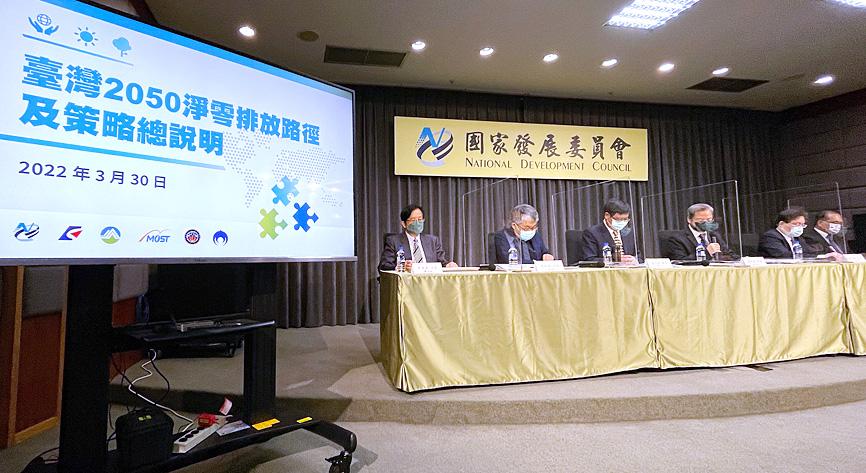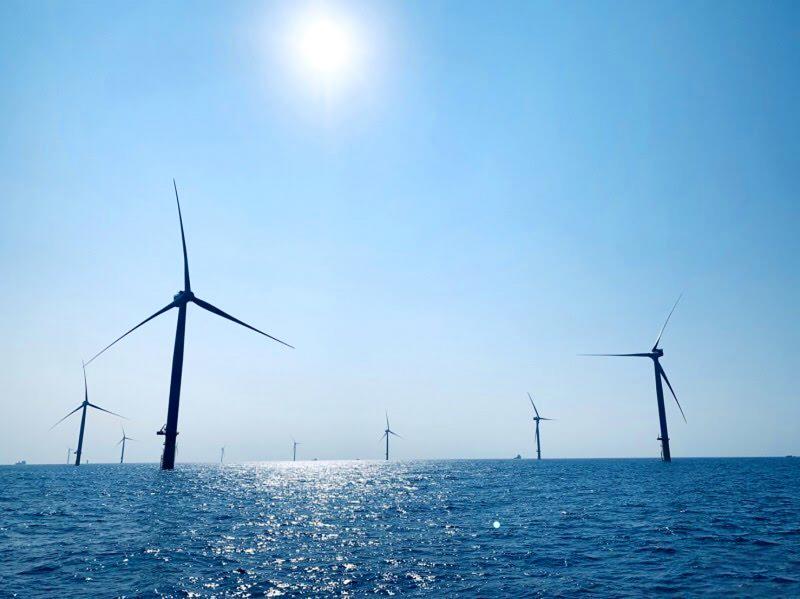The National Development Council (NDC) yesterday unveiled a road map for Taiwan’s push to become “carbon neutral,” with sources of renewable energy to account for at least 60 percent of the nation’s energy mix, which would exclude nuclear power.
NDC Minister Kung Ming-hsin (龔明鑫) said there is no need to worry about electricity shortages or a lack of green energy during the transition.
The nation is capable of increasing electricity supply by 2 percent each year, sufficient for companies to expand their operations, Kung said.

Photo: Liu Hsin-de, Taipei Times
He confirmed plans to impose a carbon tax to subsidize the development of green energy sources and purchases of electric vehicles, among other things.
However, the government would give companies time to gain better understanding of the initiative and make adjustments before introducing the carbon tax, Kung said, adding that it would set aside some green energy resources for small and medium-sized enterprises to purchase.
Heavy users of electricity, such as Taiwan Semiconductor Manufacturing Co (台積電), have inked deals to buy green energy to be developed by local suppliers for the next 20 years, the council said.

Photo: Lo Chi, Liberty Times
Technology titan Apple Inc requires companies in its supply chain to support the carbon neutral policy, it said.
The government would earmark NT$900 billion (US$31.49 billion) from this year to 2030 to pursue the policy goal, including NT$210.7 billion to be used to develop renewable and hydrogen energy sources, NT$207.8 billion to build smart grids and storage facilities, NT$128 billion to replace conservation equipment and NT$168.3 billion to promote electric vehicles, the council said.
State-run businesses would contribute NT$440 billion and the undertaking might induce an additional NT$4 trillion of private investment, it said.
“We aim to raise the ratio of electric transportation tools in the hope that electric buses will make up 100 percent of street buses by 2030,” Kung said, adding that he expects all private vehicles for sale in the local market to be electric by 2040.
The government has no intention to ban non-electric vehicles, but would use subsidies to promote electrification, he said.
It would start with government-owned vehicles and extend the practice to taxis and other areas, he said.
The government plans to review its road map every five years, as ever-changing technologies warrant a diversified approach, he said.
The council is to release more details this year on how it intends to cut carbon emissions by 2030, Kung said.

Taiwan is gearing up to celebrate the New Year at events across the country, headlined by the annual countdown and Taipei 101 fireworks display at midnight. Many of the events are to be livesteamed online. See below for lineups and links: Taipei Taipei’s New Year’s Party 2026 is to begin at 7pm and run until 1am, with the theme “Sailing to the Future.” South Korean girl group KARA is headlining the concert at Taipei City Hall Plaza, with additional performances by Amber An (安心亞), Nick Chou (周湯豪), hip-hop trio Nine One One (玖壹壹), Bii (畢書盡), girl group Genblue (幻藍小熊) and more. The festivities are to

Auckland rang in 2026 with a downtown fireworks display launched from New Zealand’s tallest structure, Sky Tower, making it the first major city to greet the new year at a celebration dampened by rain, while crowds in Taipei braved the elements to watch Taipei 101’s display. South Pacific countries are the first to bid farewell to 2025. Clocks struck midnight in Auckland, with a population of 1.7 million, 18 hours before the famous ball was to drop in New York’s Times Square. The five-minute display involved 3,500 fireworks launched from the 240m Sky Tower. Smaller community events were canceled across New Zealand’s

‘IRRESPONSIBLE’: Beijing’s constant disruption of the ‘status quo’ in the Taiwan Strait has damaged peace, stability and security in the Indo-Pacific region, MOFA said The Presidential Office yesterday condemned China’s launch of another military drill around Taiwan, saying such actions are a “unilateral provocation” that destabilizes regional peace and stability. China should immediately stop the irresponsible and provocative actions, Presidential Office spokeswoman Karen Kuo (郭雅慧) said, after the Chinese People’s Liberation Army (PLA) yesterday announced the start of a new round of joint exercises around Taiwan by the army, navy and air force, which it said were approaching “from different directions.” Code-named “Justice Mission 2025,” the exercises would be conducted in the Taiwan Strait and in areas north, southwest, southeast and east of Taiwan

‘SLICING METHOD’: In the event of a blockade, the China Coast Guard would intercept Taiwanese ships while its navy would seek to deter foreign intervention China’s military drills around Taiwan this week signaled potential strategies to cut the nation off from energy supplies and foreign military assistance, a US think tank report said. The Chinese People’s Liberation Army (PLA) conducted what it called “Justice Mission 2025” exercises from Monday to Tuesday in five maritime zones and airspace around Taiwan, calling them a warning to “Taiwanese independence” forces. In a report released on Wednesday, the Institute for the Study of War said the exercises effectively simulated blocking shipping routes to major port cities, including Kaohsiung, Keelung and Hualien. Taiwan would be highly vulnerable under such a blockade, because it